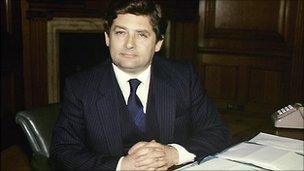Thatcher planned campaign on 'economic facts of life'
- Published

Nigel Lawson was one of those calling for the public to be "educated" about economic matters
The Thatcher government planned a campaign to "educate the public about the economic facts of life" soon after taking power, new documents reveal.
Amid concerns about inflationary pay settlements, ministers wanted to "dampen down" expectations that average incomes should rise every year.
Departments were also asked to draw up plans to cut staff and quangos as part of efforts to rein in public spending.
But the Treasury's top official said a proposed 20% budget cut was "nonsense".
Government papers newly released by the National Archives show how Margaret Thatcher's administration sought to get to grips with inflation and other economic problems facing the country after it took office in May 1979.
Senior ministers, led by the then industry secretary Keith Joseph, decided action was needed to "change public attitudes to pay" to ensure future public sector settlements were affordable.
'Economic realities'
In a letter to prime minister Margaret Thatcher on 23 July, Mr Joseph set out plans to persuade teachers, nurses and other public sector workers about the economic damage "unjustified" settlements could do.
There was a need to "dampen down deeply entrenched expectations among the public that their money income should increase each year", he wrote.
A "carefully planned" campaign must be drawn up to sell the government's message about the "economic realities" to union officials, business leaders and other opinion formers, he argued, while advertising and direct mail could be used to influence the public.
But he said there should be no public launch, in case the press became aware of the move and it seemed ministers were "nervous and preparing for a pay freeze".
He added: "We have to take account of deeply ingrained social attitudes and too heavy an assault on such attitudes could engender a spirit of resistance rather than a clear understanding of the ideas".
The then Treasury minister Nigel Lawson, later to become chancellor, said the thrust of the campaign "should not be about pay but rather a sustained campaign to educate the public about the economic facts of life".
Responding to Mr Joseph's letter, No 10 said the then chancellor Geoffrey Howe should be given overall responsibility for the matter in Cabinet while the then paymaster general Angus Maude should plan the campaign.
The documents also shed light on the Conservative government's early efforts to find savings in public spending.
In a memo drafted by a senior official in the then Civil Service Department, senior mandarins were asked to draw up plans for cuts in civil service staff of between 10% and 20% over the following two years.
But, in response, the then top civil servant at the Treasury raised concerns about the likely impact of such a move.
"For some departments - and this includes the Treasury - to get up to 20% would involve dropping functions which are so central to their role that it is almost a nonsense to consider them," Douglas Wass wrote.
The current coalition government is seeking an average 19% cut in department budgets over four years.
'Cheering people up'
In another echo of contemporary events, the papers highlight attempts to cut the number of quangos after the prime minister called for a review of the future of all existing bodies.
In a letter to Cabinet ministers, Mrs Thatcher's then principal private secretary Kenneth Stowe acknowledged "the term quango has no generally accepted definition".
In response, the then environment secretary Michael Heseltine said he would recommend abolishing 36 bodies under his authority - ranging from the Clean Air Council to the Hadrian's Wall Advisory Committee - but saw a continued role for a further 63.
But amid efforts to control pay and public spending, ministers were warned that they needed to make a better case for why such economic sacrifices were needed.
Writing to the chancellor, Treasury special adviser Peter Cropper noted that the government had rightly "started out by displaying the bareness of the cupboard and emphasising the size of the job ahead".
However, he said there was no sign of the end goal that the government was striving for.
This, he suggested, should be based around giving the public "joy, wealth, national power, two acres and a cow, a second car in every garage, interesting jobs, leisure, comfortable trains, channel tunnels, atomic power stations, gleaming new coal mines, everyone a bathroom and patios for all".
And he reminded ministers: "We must constantly remember that leadership consists largely in cheering people up, making them laugh and keeping them that way."